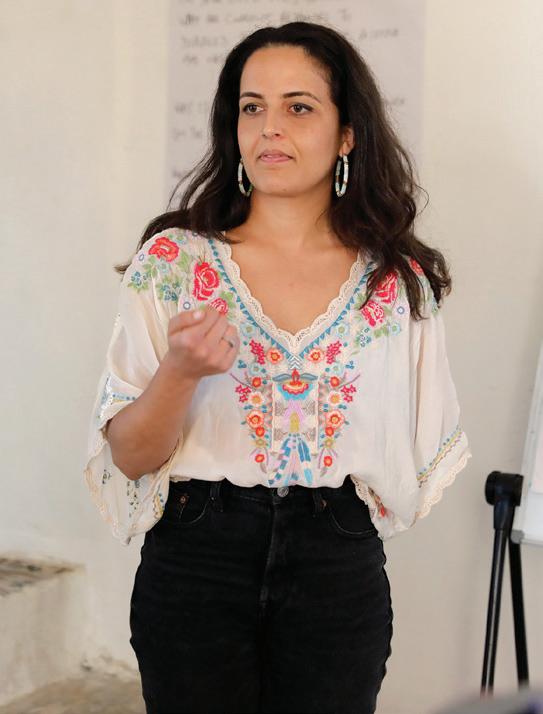
4 minute read
My journey as an Atlantic Fellow
DURKHANAI AYUBI
Atlantic Fellow for Social Equity
When Penelope Brook from the Atlantic Institute visited the University of Melbourne during my first fellowship year, it was a key moment. I heard about the Institute’s commitment to generating a global sense of community. Then I attended the first Senior Fellows Global Convening in Oxford in 2019, and what happened was quite extraordinary: I felt excitement, curiosity, and all kinds of emotions and aspirations. The Institute felt like the hub at the centre, connecting all the different spokes of the various communities globally.
As a first-generation migrant from Afghanistan, with an acute awareness of my family’s and my country’s history, and misgivings created through dominant narratives of appropriation and imperialism, I felt an electric alignment. Being able to analyze such perspectives with other Fellows broadened my thinking to a global level, allowing me to unpack my ideas on a deeper level. I was crystallizing my own views among people with similar experiences of displacement, or people who were made vulnerable in some way by “normal” systems of power.

Durkhanai is joined by Fellows from across the Atlantic programs at the Senior Fellows Global Convening
Working with the other Fellows has given me many more connection points, so I call them “stars in my night sky”. I have made a growing number of “constellations” through meeting the Fellows and now have a sharper idea of who I am, and a better understanding of my own vision and what I can create and contribute.
I was paired with Dana Walrath, Atlantic Fellow for Equity in Brain Health, for the Narrative Justice Externship; we connected and so extend each other’s thinking. Our co-created report, “Remembering through Narratives”, offers a vision for an Atlantic approach that challenges and shifts dominant narratives designed to keep us categorized, disconnected and segregated.
I experience an immersive feeling of connectivity in my work with fellow Fellows from around the globe in our Displacement Affinity Group. The group’s vision is to broaden the conversations around displacement and to shift consciousness around the discussions surrounding it. A transformative part of this work was the forum in Jordan in October 2019, where Fellows and program staff gathered to understand displacement from the perspectives of Syrian refugees. It had a huge impact on me, personally, and in terms of the shift it generated amongst the group gathered there, which is still unfolding in unanticipated and transformative ways.
The world is now riven by the impacts of COVID-19, and I have the ability to decode the ongoing impact of this pandemic on issues of social justice. My connection to a global Atlantic community has broadened my pool of knowledge and developed my ideas and writing. An invaluable offering from the Atlantic Institute has been the webinar series, “A (K)new World Reimagined”, in which I had the opportunity to be a moderator. In the discussion about (k)new modes of leadership, our own Atlantic Fellows, with panel members from around the globe, shared visions of leadership to meet the challenges and combat inequities.
The convenings run by the Institute, featuring academics, speakers and Fellows, have encouraged me to explore ideas with more rigor. What resonates the most are topics about deeply human concerns where the humanness is lacking. For example, narratives around the transition to market societies have evolved in a way that normalizes the dehumanizing aspects of capitalism. My capacity to understand and decode such narratives that normalize gross injustices has increased. My desire to develop informed counter-narratives and independent thinking has grown, influenced by the context of my life story and my own trajectory.
At a workshop run by the Institute, a discussion about the market-driven model of leadership made me think: “What parts of this now largely normalized narrative of leadership, embedded in a vision of power that elevates exceptionalism, is being brought into social justice spaces, thereby entrenching inequity even further?”. I can now look at things in multi-layered ways, and speak with greater clarity.
In my book, “Parwana: Recipes and Stories from an Afghan Kitchen”, my experience as a Fellow has been etched into the pages, unfurling through narratives which invite and implore readers to look beyond the superficialities around Afghanistan. Instead, I reveal interconnections encoded within Afghanistan’s rich history and cuisine. The overall transformative impact for me, as an Atlantic Fellow, has been that I have a tether — a lifeline — to a global community of people who have the desire to share knowledge and parts of themselves, in ways that transgress all constructed boundaries. They offer a very real and tangible vision for an idea of power that is reimagined; one that values human dignity and our humanness.
I have come to see the community almost as an extension of myself. I don’t think I would be able to say that about much else that is collective. It comes down to the Atlantic community’s values about how people are treated. I feel I am a part of something that seriously respects the dignity of others and the value of humanity while being committed to unearthing and enlivening known, but long forgotten, ways of approaching our collective challenges.
I have trust in how the community evolves. What grows from here, from the planting of this seed, I believe emerges from the wellspring of what it means to be human — which is, through its potential to return us to our deeper selves, transfiguring.

With other Atlantic Fellows for Social Equity outside Rhodes House, Oxford, UK

Below: Durkhanai in conversation with Selam Bedada, Assistant Program Director of the Atlantic Fellows for Health Equity US + Global program










